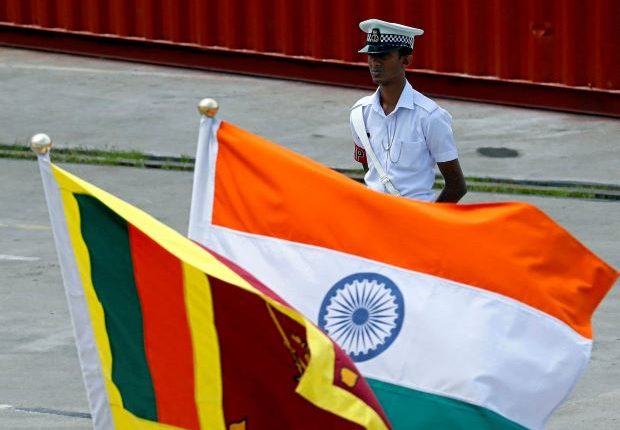India using Tamil card to disengage Sri Lanka from China
By Pranay Sharma
India has decided to use the Tamil card to caution Sri Lanka from moving further into China’s embrace to avoid deepening the island’s economic crisis and posing serious strategic challenges for New Delhi.
In an unusual move in Geneva on September 12, India came out with a strong statement criticizing Colombo for lack of “measurable progress” in finding a political solution to its ethnic Tamils issue.
For domestic compulsions, especially with the presence of political parties like the Dravida Munnetra Kazhagam (DMK) in coalition governments, there have been occasions when India has supported Western resolutions in criticizing Sri Lanka’s human rights record.
However, in recent years, New Delhi has avoided criticizing the neighbour at international forums for its human rights record and mostly abstained from anti-Sri Lankan resolutions. Yet, in bilateral discussions, it has always urged Colombo to take urgent political steps to resolve the issue of the Tamil ethnic minority.
Significantly, India’s castigation of Sri Lanka in Geneva came after Colombo allowed a Chinese research vessel, widely believed to be a ‘spy ship’, to dock in Hambantota port last month even after New Delhi expressed security concerns over its intentions.
Indian officials denied its statement was in connection with last month’s presence of the Chinese vessel in the Sri Lankan port. But observers found the timing of the two to be extremely relevant in the expression of India’s disappointment with Sri Lanka.
Earlier, an Indian travel advisory asking its citizens to be careful about travel to Sri Lanka in the wake of the Chinese ship’s arrival there had led to a sudden drop in the number of Indian tourists to the island, raising concerns in the country’s tourism industry.
Participating in a debate at the UN Human Rights’ Commission in Geneva on September 12, India said that it has always believed in the responsibility of States for “promotion and protection of human rights and constructive international dialogue and cooperation guided by the principles of the UN Charter.”
India noted with concern the lack of progress by Sri Lanka on its commitment to a “political solution to the ethnic issue through full implementation of the 13th Amendment of the Constitution, delegation of powers to Provincial Councils and holding of Provincial Council elections at the earliest.”
India said it always supported a political settlement “within the framework of a united Sri Lanka, ensuring justice, peace, equality and dignity for the Tamils of Sri Lanka.”
India’s Permanent Representative to the UN in Geneva, Indra Mani Pandey, pointed out that it was in Sri Lanka’s best interests to ensure devolution of power that India called for early conduct of elections to the Provincial Councils. “We, therefore, urge Sri Lanka to take immediate and credible action in this regard,” he said.
Observers said this was India’s most severe criticism of the Sri Lankan government in recent years.
India got the opportunity of making its point after the Office of the High Commissioner for Human Rights (OHCHR) released a report and its representative urged Sri Lanka to improve its human rights record and strengthen institutions to tackle the challenges it faces in the wake of its worst financial crisis in seven decades.
India’s permanent representative in Geneva pointed out that the “current crisis in Sri Lanka has demonstrated the limitations of the debt-driven economy and the impact it has on the standard of living.”
India-Sri Lanka relations were seriously strained when Colombo allowed Chinese submarine and warships to dock at Hambantota port in 2015.
The decision to allow the Chinese naval vessels had come as Sri Lanka received heavy investments from China in the infrastructure sector of the island.
However, Colombo soon realized that it was not in its interest to alienate India—the net security provider in the region. As part of a course-correction, Sri Lanka began pursuing a “India-first” policy to strike a balance between the two regional powers.
Most experts now blame the mounting debt repayment amount for Chinese investment in the country as the key contributor to Sri Lanka’s current financial crisis.
India was one of the first countries to come to Sri Lanka’s help after it extended over $4 billion to Colombo in soft loans and currency swaps to help it tide over the crisis.
But the Sri Lankan government is also in talks with China to restructure its debt before it can finalize a $2.9 billion loan from the International Monetary Fund (IMF). Experts fear that borrowing more money from Beijing could land Colombo in a much deeper debt trap.
Such a scenario might lead Sri Lanka to give in to more demands from China to expand and consolidate its presence in the island, much to India’s concern.
Questions about its human rights record and the lack of progress in resolving the issue of ethnic Tamils in Sri Lanka could be a pressure point against Colombo. But how effective it will be against Sri Lanka’s reliance on China, a country whose presence in the island is growing by the day, remains to be seen.
-Pranay Sharma is a commentator on political and foreign policy related issues and this article was originally featured on moneycontrol.com



Comments are closed, but trackbacks and pingbacks are open.